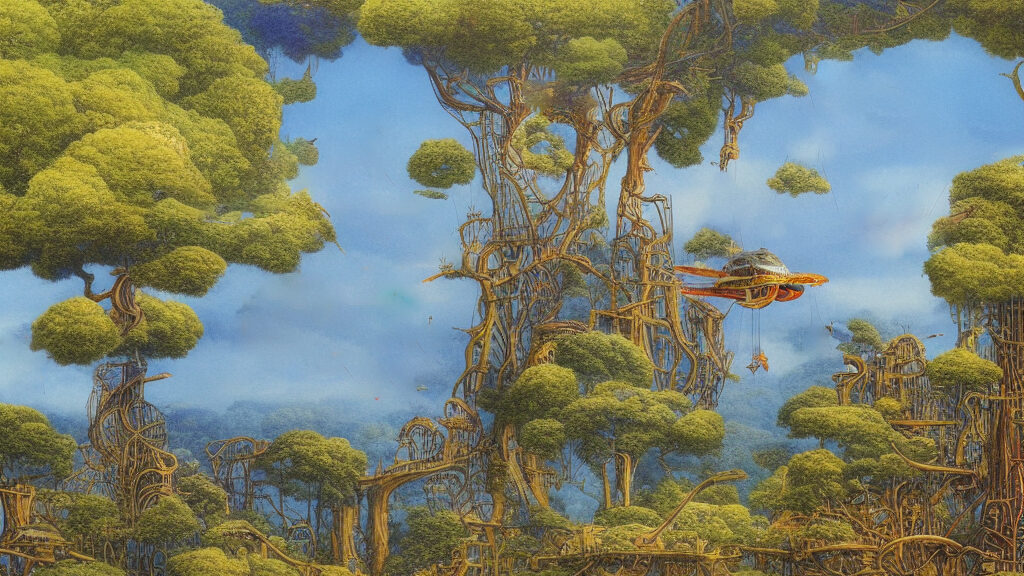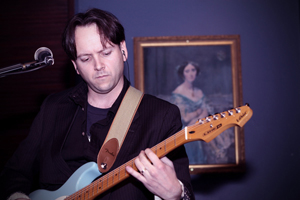
Craven discusses his musical background and various projects with Progressive Rock Central.
When did you start playing music?
I was 6 when I took up the violin. Unfortunately I was never very good at it since I hated practicing and was only ever taught to play the notes on the page. Luckily I learned a bit about music theory along the way, which could then be applied to other instruments.
What kind of musical training do you have?
That was it! I picked up a guitar fairly late in the game when I was 17, and everything started to fall into place. By that time I was more interested in not taking lessons and not studying music, so as not to take away the magic, and I wanted to rely on my instincts instead.
I’m sure formal training could have brought my technical skills up to speed much faster. But then I would have missed out on the exploration and self-discovery and interesting mistakes that all go towards forming your own musical identity. As with everything perhaps the best approach is somewhere in between.
How many instruments do you play?
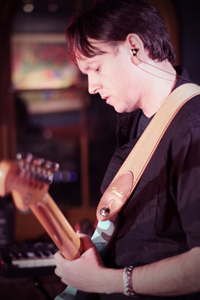
In the 1970s when Mike Oldfield was doing it, being a multi-instrumentalist was remarkable. Now not so much. I can play piano and drums well enough for my own needs, and if you can play guitar you can have a crack at most stringed instruments, which I like to do. There’s some mandolin on my first album, lap steels all over the place, and I recently bought a pedal steel that needs my attention.
Which is your favorite instrument?
Fairly obviously I lean towards guitar, electric mainly. More than any other instrument I think it responds the most to the personality of the player. And on top of that there’s so much sonic territory you can explore with the choice of guitar, amplifier, pickups and effects.
But having said that I can imagine I’d be fairly contented if fate placed me in the role of a lead bass player, or decreed I must play keyboards.
When did you discover progressive rock?
Apparently I was subjected endlessly to Dark Side Of The Moon in the womb. I can believe it. I remember when I was 3 or so being particularly keen on a tape of Days Of Future Passed by the Moody Blues. So these sorts of things were in my blood before I realized it, and certainly before I had any notion of musical genres, or the unfashionability of prog at the time.
Gradually I became a huge fan of Pink Floyd, and this led me to reach out to Yes, King Crimson, ELP and Genesis. I’ll never forget the first time I heard Heart Of The Sunrise or Close To The Edge.
Who can you cite as your main musical influences?
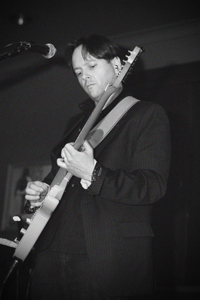
Film music composers like John Williams, John Barry, Bernard Herrmann and Jerry Goldsmith are also incredibly influential. They can take the classical format and produce a 3-minute theme which is as good as anything I’ve heard. My favorite movies are the ones which are strong enough to withstand fantastic scores, and listening to the score on its own can be as good as watching the movie.
I was very upset when John Barry and Jerry Goldsmith passed away, and I’m incredibly grateful that John Williams seems to be just as strong as ever. It’s encouraging to take their lead and assume I still have 50 years of writing ahead of me!
How does the composition process work?
I’m sure it’s very different for different people. But for me there’s the inspiration and then the perspiration. The raw diamonds in the rough, the little nuggets of musical inspiration, can happen anywhere, anytime and be triggered by anything. Brian Wilson called them “feels”. It’s incredibly important to capture them at conception and let them develop as much as possible in those brief moments before the conscious mind takes control again, as it generally likes to do. Later on comes the completely different process of being a craftsman, choosing arrangements and song structures, and consciously making decisions about lyrics. That’s the hard work, but it makes all the difference between a finished song and an unfinished snippet.
Where do you get your inspiration from?
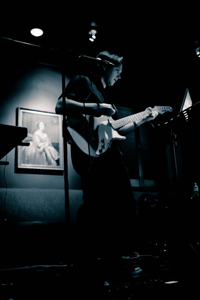
On the bigger scale, I take most of my inspiration from people who have managed to make a living out of creative freedom. Whether it be in film, art, books, whatever. It somehow makes a piece of work much more interesting to me if I know it’s exactly the way the creator intended it, and it’s done with conviction.
Tell us about your first recordings.
I had a dual cassette recorder and a cheap children’s keyboard with miniature keys. I discovered there was a “mixing mic” input on the back of the cassette recorder, which let me record one live overdub as a tape copied. It was a crude way of making multi-track recordings, and by the time you were finished the first track was lost in tape hiss and had been completely detuned. Still, great fun.
When I was 16 a friend introduced me to MOD trackers on the PC, which was a 4-track system using samples, note information and awful sample rates. But suddenly I was able to get ideas out of my head into a band format. I moved onto basic MIDI and followed sequencers as they grew to include audio tracks, until desktop computers were powerful enough to handle multi-track audio. Then I started recording demos for my first album, Two False Idols. By the time audio plugins were within my reach, I knew that I could also be the studio.
Your most recent album has made a splash in the progressive rock community. Why did you decide to do it as a solo project?
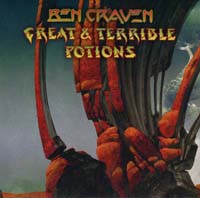
I imagine that if I’d lived in London or LA [Los Angeles] I would have met enough like-minded musicians by now to have formed a band where everyone contributed creatively. That was my intention on my first album, Two False Idols, but it never worked out that way.
You used the legendary graphic artist Roger Dean for your album design. How did you connect with him?
After the album was recorded, I explored the idea of releasing it through a local record label. The head of the label loved it and suggested that a Roger Dean cover would go very well with the music. Well, duh! Pipe dream, I thought, so I disregarded it almost straight away. But it turned out he had a friendship with Roger. We made contact and eventually came to an agreement.
Of course I’d previously met Roger and got his autograph in Sydney when Yes toured Australia in 2003, but I was just another Yes fanboy and I’m fairly sure he didn’t remember!
I’m incredibly pleased with how it all turned out. I think the painting is beautiful and it matches the dark and sinister atmosphere of most of the music very well. And it’s still hard to believe I’ve worked with one of the greatest cover artists in the world.
How important are the other art components, aside from music?
The music is most important, but I have a hard time separating some of the great classic rock albums from their iconic covers. And I’ve always been a stickler for poring over the artwork or packaging, whether it was a gatefold vinyl cover when I was a kid, or a CD booklet. It doesn’t hurt to titillate the other senses at the same time.
Now that digital downloading is taking over, I think it’s more important than ever to give people a reason to buy a physical copy. The artwork and the packaging, even the medium, can help with that. I’ve been hassled by a few people demanding to see Great & Terrible Potions on vinyl. I’m delighted to say it’s on its way in a few weeks, with a Roger Dean gatefold sleeve!
Will you be continuing to work as a solo artist or do you plan to form a band?
I can’t imagine not working as a solo artist for a while. It was a long and considered decision to put my name on the front of Great & Terrible Potions, rather than use an imaginary band name. Potions is an independent release, so with my limited funding I’ve been promoting and hoping to build up the “Ben Craven” name.
However that leads to a few problems playing live. I’ve actually just started rehearsing with a 3-piece band, reinterpreting the songs in a band context for live performance. Somehow we’ve managed to distill the symphony orchestra and soundscapes on the 11-minute ‘No Specific Harm’ down to just us!
Do you have any tours planned?
Not at this stage but I’m hoping we can do some small tours once the show is polished.
Have you been approached by any progressive rock artists inside or outside of Australia?
Not really. I don’t think Australia has a very strong progressive rock community, and I’m still fairly unknown to boot. Having said that, I’m incredibly easy to contact and open to considering all sorts of collaborations!
How’s the progressive rock scene in Australia now?
I think Australian progressive rock is doing much better overseas than in Australia. A few bands like Unitopia and Anubis have done very well, and Sebastian Hardie has a new one out too. But there’s very limited local radio support and the population is just too small for sustained live work. Most of the prog rock market appears to be overseas. In fact my biggest sales have been in Europe.
Making a living from music is not easy, are you a full time musician?
I’m afraid not. I’m the musician, the studio and the label, which means I fund the lot and need a day job! The advantage of that situation is I have complete creative control and don’t have to worry too much about compromising my work to meet a particular deadline.
If you could gather any musicians or musical groups to collaborate with whom would that be?
I’d be thrilled to work with any of my musical heroes from any aforementioned bands. I’d equally be as thrilled just to have a drink with them. I think Billy Sherwood has the right idea, producing tribute albums and collaborating with everyone he wants to! Bill Bruford or Nick Mason please give me a call to discuss your session fee for playing drums on my next album.
What was the first big lesson you learned about the music business?
That nobody really cares. The music “business”, like any business, is there primarily to make money. These people need to make a living. If you as an artist can help the business make money, the business will be friends with you. But mainly because of your potential for making income, rather than your artistry. Artistry and commerce working hand in hand is a precarious position fraught with danger.
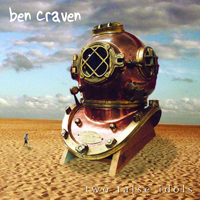
Are you working on new projects?
I’ve just finished working on the vinyl version of Great & Terrible Potions, and the LPs should be arriving at my doorstep any day now. I’ve also completely remixed and remastered my previous album, Two False Idols, which is available on Bandcamp shortly.
I’m halfway through a concept album about a turn-of-the-century Oklahoma outlaw who just happened to be called Ben Cravens. It’s a strange combination of country and prog. But I’m itching to start working on the natural follow-up to Potions. The demos have been completed for a while and I’m really looking forward to finishing them off. It will probably have more symphonic elements and teeter on the edge between film soundtrack and rock album.
